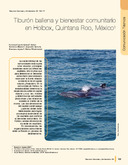Tiburón ballena y bienestar comunitario en Holbox, Quintana Roo, México

View/
ISSN
ISSN: 1659-1216Date
12-2008Author
Cepeda Gómez, C.
Gutiérrez Montes, Isabel A.
Imbach Hermida, Alejandro C.
Alpízar Rodríguez, Francisco
Windevoxhel, N.
Type
Artículo
Metadata
Show full item recordAlternative title
Whale shark and community well-being in
Holbox, Quintana Roo, México.
Abstract
Se analizaron los medios de vida de la comunidad de Holbox utilizando el marco de los capitales de la comunidad (MCC) como herramienta de diagnóstico. Simultáneamente, se utilizó el método de costo de viaje (CV) como herramienta de valoración económica para establecer la relación entre la presencia del tiburón ballena (Rhincodon typus) y los ingresos que Holbox deriva del turismo. Con estas herramientas se perfiló la situación actual de la comunidad y se estableció la relación existente entre los beneficios provistos por el área propuesta como reserva de la biosfera y el bienestar comunitario. El potencial del capital natural se evidenció mediante el valor de uso del área de avistamiento del tiburón ballena en actividades turísticas. Sin embargo, el libre acceso a los recursos marinos, la ausencia de vigilancia, el número ilimitado de permisos otorgados (capital político) y la competencia desleal entre prestadores de servicios turísticos (capital social) desincentivan la conservación del capital natural. Esto podría acarrear un cambio de comportamiento de la especie, que derive en la pérdida de ingresos si declina el turismo (capital financiero) y en un deterioro reciente de los capitales que afecte de manera negativa las estrategias y oportunidades. Holbox’s community livelihoods were analyzed using the Community Capitals Framework (CCF) as a diagnosis tool. Simultaneously, the Travel Cost Method (TCM) was used as a tool for economic valuation to establish the relationship between the presence of the whale shark (Rhincodon typus) and the income Holbox obtains from whale shark tourism. With these tools, the present situation of the community was identified, and the existing relationship between the benefits provided by the proposed Biosphere Reserve and community’s well-being was established. Natural’s capital potential was evident through the use value of the whale shark sightseeing area in tourism activities. Nevertheless, marine resources open access, monitoring absence, disloyal competition between tour operators (social capital) and the unlimited grant of whale shark tourism licenses (political capital), discourage natural capital conservation. This can result in a change of the species behavior which would derive in an income loss due to tourism declining (financial capital) and in increasing deterioration, affecting negatively the community’s strategies and opportunities. 9 páginas
Keywords
Publisher
CATIE, Turrialba (Costa Rica) CATIE, Turrialba (Costa Rica)
URI (Permanet link to cite or share this item)
https://repositorio.catie.ac.cr/handle/11554/6851473354


